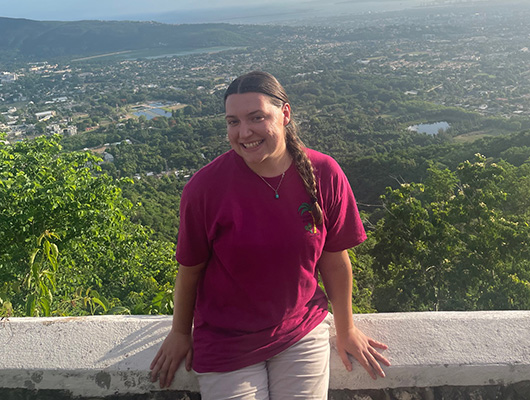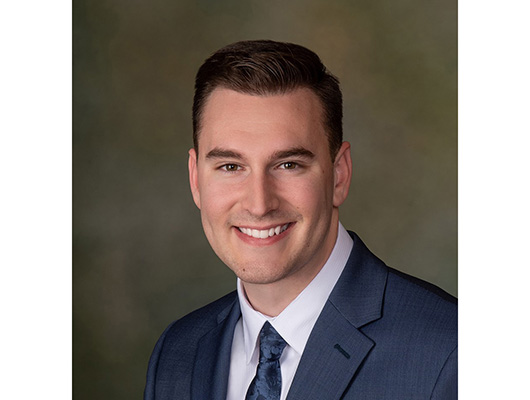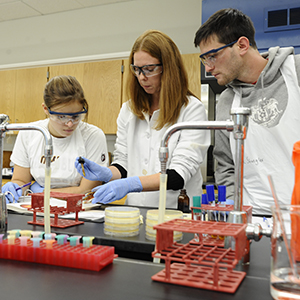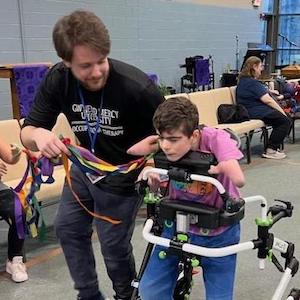Bachelor of Science in Public Health
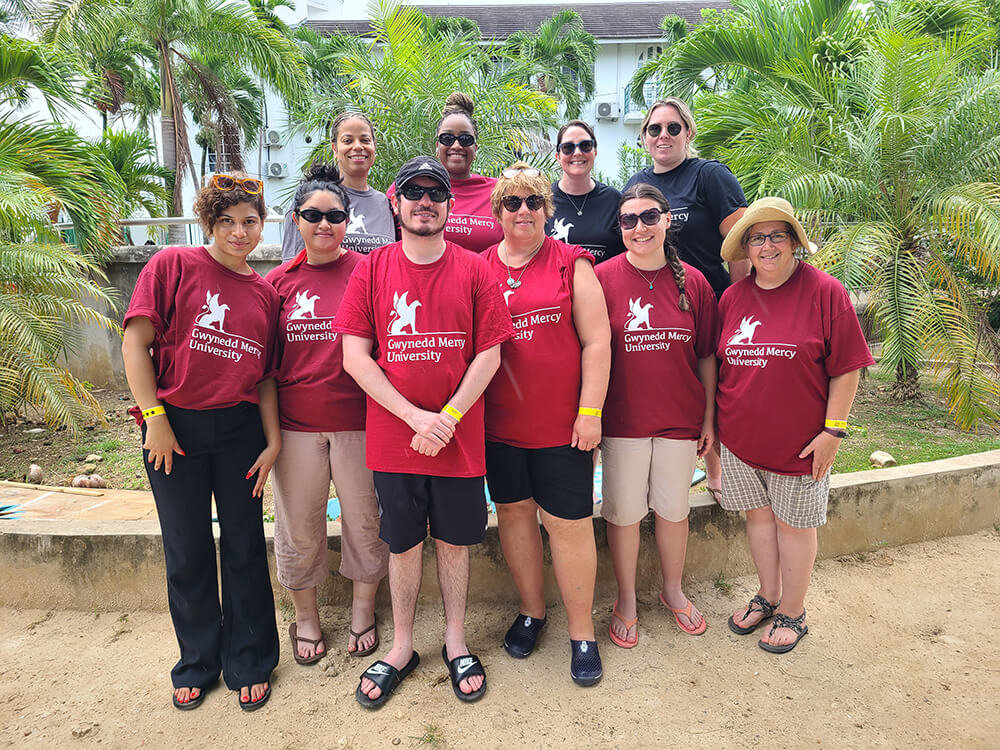
Protect and promote health in communities
Public Health focuses on promoting health and preventing disease among people, wherever they are. We address issues such as obesity, food deserts, infectious and chronic diseases, gun violence, substance use, and environmental exposures. Using evidence-based strategies, we strive to prevent people from injury and illness before they occur.
GMercyU's Bachelor of Science in Public Health is a terrific option for those who want to make a difference in their communities or healthcare industry outside of a clinical practice.
With your degree, you can address social inequity in the form of health disparities and promote healthy lifestyles and choices in your community and around the world.
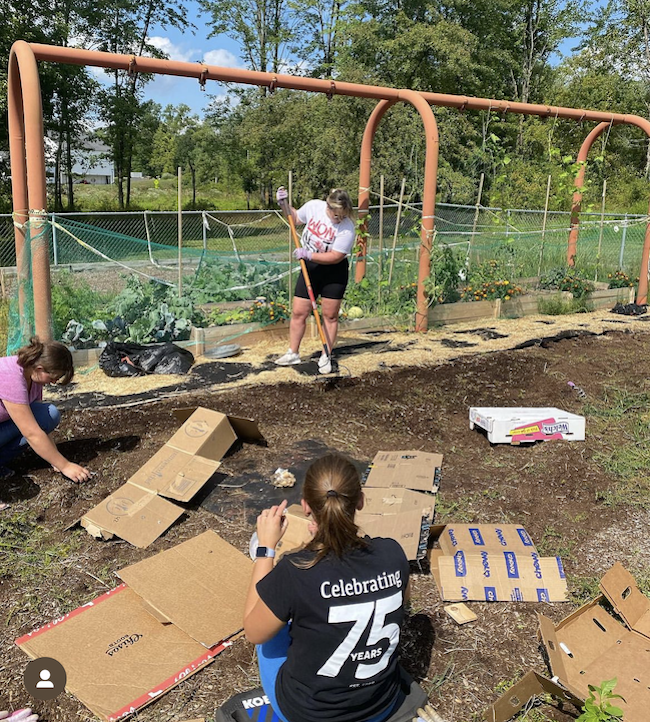
Our Public Health Program is CHES-eligible, meaning you’ll be prepped and ready to take the CHES (Certified Health Education Specialist) credential exam before you graduate and enter the workforce.
More benefits include:
- Classes that focus on applying public health skills to build your confidence in the field and your resume
- Personalized instruction with GMercyU’s low 10:1 student-to-faculty ratio
- Courses taught by full-time faculty with expertise in the field (no teaching assistants)
- An internship that’s built into your final semester’s coursework, where you can apply your new skills and knowledge in a professional setting
- A grant-writing capstone project that will help you develop a marketable skill
- Career mentorship to help you navigate the opportunities in the field and find the best path to match your skills and specific interests
- The opportunity to study abroad
- The Griffin Edge, which will help you connect the dots between your GMercyU experiences and your future aspirations, so you can ace future job interviews and launch a successful career. Learn more about The Griffin Edge here.
And, you will learn at an institution whose history and mission is rooted in service. At GMercyU, we have been developing change-makers and social justice advocates for decades.
In 2024, Public Health and Psychology students and faculty traveled to Kingston, Jamaica, to work with the Mustard Seed Communities, an international nonprofit organization that provides care to vulnerable populations. Our programs will be collaborating again in 2026 to return to Jamaica to provide health education for adolescents living with HIV or who are new or expecting mothers.
Opportunities like this trip allow you to apply the skills you have learned and share your knowledge as you learn from others about their culture and country.
Public health students must complete 51 credits in public health courses.
| PUB 100 | Introduction to Public Health |
| PUB 200 | Health Behavior & Health Education |
| PUB 210 | Public Health Policy & Advocacy |
| PUB 220 | Community Needs & Capacity Assessment |
| PUB 230 | Environmental Health |
| PUB 240 | Human Disease & Disease Prevention |
| PUB 250 | Health Communication Strategies |
| PUB 310 | Introduction to Epidemiology |
| PUB 320 | Public Health Research Methods |
| PUB 330 | Planning & Evaluating Public Health Interventions |
| PUB 480 | Public Health Professional Seminar |
| PUB 490 | Public Health Internship |
| PUB 495 | Public Health Capstone |
| PUB | 4 Public Health Electives* |
*Different electives are offered each semester and include courses such as Public Health Across the Lifecourse, Global Health, Data Detectives, and Promoting Global Health Through Community-Engaged Learning.
Undergraduate Minors
Increase the value of your public health degree by adding an undergraduate minor that best meets your personal and professional goals.

Here's a look at just a few of the courses you'll take as a GMercyU Public Health major:
PUB 210 Public Health Policy & Advocacy
In this course, students will examine the role of policy in health and healthcare, comparing systems of healthcare in the US and other countries. Students will learn strategies to influence health policy and act as advocates for public health.
PUB 310 Epidemiology
In this course, students will develop an understanding of the field and methods of epidemiology. Students will examine disease surveillance systems around the world and explore strategies used to understand disease cause and spread and to improve population health.
PUB 330 Planning & Evaluating Public Health Interventions
In this course, students will integrate their understanding of human health, determinants of health, health data, research, and strategies to affect health into the development of health education and promotion interventions designed to meet the needs of communities. Students will learn how to how to develop an effective intervention to address the identified need, and how to design and implement an evaluation and use evaluation results to improve health.
For all Public Health program course descriptions, please refer to the undergraduate catalog.
 Victory Osezua, PhD, MPH
Victory Osezua, PhD, MPH
Position: Assistant Professor
Did You Know? Dr. Osezua also works as an independent public health consultant for various non-profit organizations across the country.
Read bio
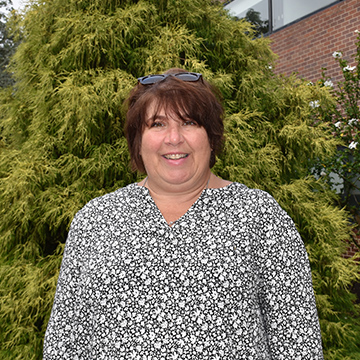 Maria Warnick, PhD, CRNP FNP-BC
Maria Warnick, PhD, CRNP FNP-BC
Position: Assistant Professor
Did You Know? Dr. Warnick completed a doctoral program in public health with a focus in epidemiology after years of experience as a family nurse practitioner.
Read bio
Meet a Public Health Major
Meet more students — watch GMercyU's episode of The College Tour!
My [Public Health] professors have played a significant role in providing support and guiding me toward my passion: environmental epidemiology. This field investigates the impact of environment stressors on health, encompassing both the built and natural environment.
— Justin Hartranft '25
Real-World Opportunities
As Public Health major at GMercyU, you will complete a seminar focused on exploring internship opportunities, so you can find the right fit for your interests. Then, in your final semester in the program, you will gain invaluable experience in a setting that matches your unique career goals.
Some students pursue internships beyond this requirement. For example, in summer 2024, Justin Hartranft '25, worked as a Vector-Borne Disease Surveillance and Prevention Intern in the Division of Communicable Disease Control and Prevention at the Montgomery County Department of Health & Human Services.
Here are just a few of your internship options:
- American Red Cross Tri-County Chapter
- Berks WIC Nutrition Center
- Bucks County Heath Improvement Project
- Chester County Health Department
- Coatesville Center for Community Health
- Chester County Food Bank
- Valley Youth House – Chester County Office
- Family and Community Services of Delaware County
- Pennsylvania Resources Council Eastern Regional Office
- Montgomery County Health Department
- Women’s Center of Montgomery County
- Health Federation of Philadelphia
- Philadelphia Department of Public Health
- Philadelphia Health Partnership
- Public Health Management Corporation
Job opportunities in the field of public health are expected to increase nationally by 11% through 2034, much faster than the national average, the Bureau of Labor Statistics reports.
Our students often begin work immediately after graduation. Here's where some of our graduates have recently launched their careers:
- Administrator, Harro Hofliger
- Community Outcome Specialist; Asociación Puertorriqueños en Marcha (APM)
- Disease Investigation Specialist at the Delaware County Health Department
- Education Outreach Liaison at Doylestown Health
- Lead Care Manager, Serene Health
- Medical Advocate Program Coordinator at Laurel House
- Mental Health Practitioner, Access Services
- Youth Coordinator, New Hope Solebury Cares
Here are more possible careers for those with a bachelor’s in public health:
- Community health worker
- Disease prevention specialist
- Emergency response planner
- Environmental health specialist
- Health advocate
- Health educator
- Occupational health and safety professional
- Policymaker
- Program coordinator
- Public health officer
- Research scientist
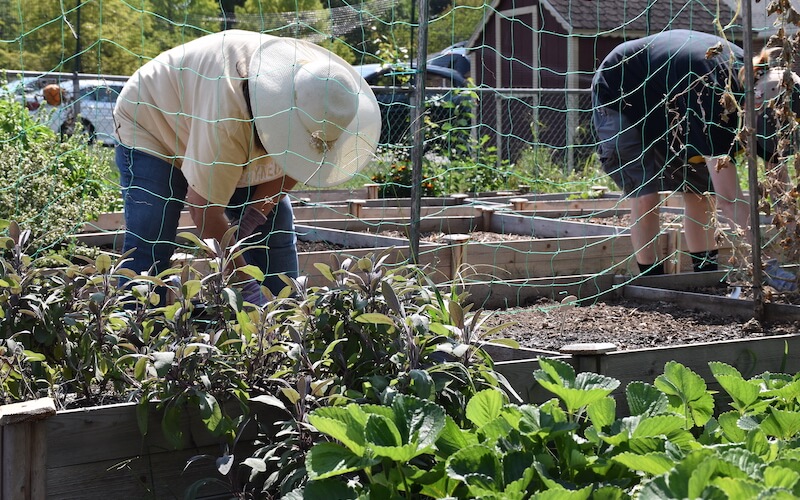 Campus Learning Garden
Campus Learning Garden
The first graduating cohort of GMercyU's Public Health program wanted to leave a legacy on campus for practicing public health and applying the skills they learned.
Students helped construct the garden's raised beds and planted several hardy varieties of fruit, vegetables, herbs, and pollinating flowers to get the garden started, which has grown considerably since then.
Produce is harvested by students for Catherine's Cupboard.
Public Health Minor
Explore the intersection of public health with your major’s field, including the influences on health where people live, learn, work, and play.
Scholarships & Grants
GMercyU offers dozens of scholarships and grants to help you save on a great education. They do not need to be repaid and generally are renewable each year.
Transfer to GMercyU
GMercyU grants up to 90 qualifying credits toward a bachelor's degree and offers renewable transfer scholarships and grants ranging from $11,000 to $21,000 a year.

